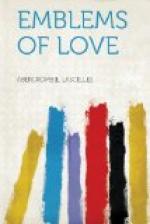Your senses lie, in a delicious gaol
Of harmony, hours of string’d enchantment.
Or if you wake your ears for the river’s voice,
You hear the chime of fawning lipping water,
Trodden to chattering falsehood by the keels
Of kings’ happiness. And what is it to you,
When strangely shudders the fabric of your navy
To feel the thrilling tide beneath it grieving;
Or when its timber drinks the river’s mood,
The mighty mood of man’s Despair, which runs
Like subtle electric blood through all the hulls,
And tips each masthead with a glimmering candle
Blue pale and flickering like a ghost? For you
Are too much lit to mark a corposant.
Nor yours the stale smell of the unhealthful stream,
Clotted with mud and sullen with its weeds,
Who carry your own air with you, blest sweet
And drencht with many scattered fragrances.
You, sailing in golden ignorance, know not
The anxious flow of life under your way:
Do you not miss half the wonder of you?—
That so your happiness in the thought of God
Stands, that he open’d man’s expense of grief
To give your oars unscrupulous room, to be
The buoyancy of your delighted barges,
Sliding with fortunate lanterns and with tunes
And odorous holiday, O kings, O you
The pleasure of God, richly, joyously launcht
On this kind sea, the tame sorrow of Man?
You need poets to reckon your marvellousness——
Ahasuerus. Where is he driving? I set thee not to this; It was to tell what I, not what they, be.
Poet. How can they know what thou art, if not first I tell them what they are themselves, my king?
Ahasuerus. Thou hast a night, man, not
a week to tell them. You men of words, dealers
in breath, conceit Too bravely of yourselves;—O
I know why You love to make man’s life a villainous
thing, And pose his happiness with heavy words.
You mean to puff your craft into a likeness Of what
hath been in the great days of the Gods. When
Tiamat, the old foul worm from hell, Lay coiled and
nested in the unmade world, All the loose stuff dragg’d
with her rummaging tail
And packt about her belly in a form,
Where she could hutch herself and bark at Heaven,—
The god’s bright soldier, Bel, fashioned a wind;
And when her jaws began her whining rage
Against him, into her guts he shot the wind
And rent the membranes of her life. So you
Wordmongers would be Bel to the life of man.
You like not that his will should heap the world
About him in a fumbled den of toil; And set the strength
of his spirit, not to joy, But to laborious money;
so you stand forth And think with spoken wind to make
such stir And rumble in the inwards of man’s
life, That he in a noble colic will leap up Out of
his cave of work and breathe sweet air. You will
not do it: man prefers his den. Now leave
mankind alone and sing of me.




